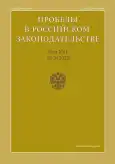Cyberterrorism as a Global Threat to National Security
- Authors: Tsrimov A.A.1
-
Affiliations:
- Krasnodar University of the Ministry of Internal Affairs of Russia
- Issue: Vol 16, No 5 (2023)
- Pages: 133-137
- Section: General theoretical, criminal-legal and other problems of Countering extremism and terrorism. Problems of preventing extremism and terrorism
- URL: https://journals.eco-vector.com/2072-3164/article/view/568805
- EDN: https://elibrary.ru/LPGIVR
- ID: 568805
Cite item
Abstract
The purpose of this study is to study cyberterrorist threats emerging in the global information space and ways to counter them.
Cyberterrorist organizations set themselves the goal of destroying state systems, preventing the functioning of information structures, computer systems, databases, infiltrating the infrastructure of the public administration system and destroying it. Crimes are aimed at important objects of the state, therefore they pose a great threat and can have far-reaching dangerous consequences that can affect all citizens as a whole or their individual groups. It is important to understand not only what goals cyberterrorists may be interested in, but also what cyberspace is attractive to them, what methods they can use to achieve their goals. Modern technologies are actively studied by criminal groups for their further application in their activities. For example, they allowed gangs to abandon the hierarchical system and switch to a decentralized form, which significantly complicates the search and detention of members of such organizations. The use of technology allows criminals to increase the efficiency of their activities, better hide from law enforcement agencies.
It is concluded that the development of terrorists in the use of technology is also dynamic, since their type of activity requires deep conspiracy and flexible capabilities. Criminals, after committing certain actions, analyze them, understand what they did successfully and what they did not, exclude mistakes that may lead to their arrest or an unsuccessful attack in the future. This allows them to prepare well for the next actions. Thus, one of the key problems for the law enforcement system is the adaptability of responses to cyberterrorism. It is important to create a system that can change quickly and respond to threats, as criminals themselves change their tactics and actions.
Full Text
About the authors
Amir A. Tsrimov
Krasnodar University of the Ministry of Internal Affairs of Russia
Author for correspondence.
Email: alimkardkardanov@yandex.ru
Police Lieutenant Colonel, Senior lecturer of the Department of Fire Training, North Caucasus Institute for Advanced Studies (branch)
Russian Federation, Nalchik, KBRReferences
- Abazov I.S. On ways to counter cyberterrorist threats // Journal of Applied Research. 2022. Vol. 2. No. 6. pp. 178-181.
- Aripshev A.M. CYberterrorism: problems in understanding and ways of countering // Journal of Applied Research. 2023. No. 4. pp. 109-112.
- Golubeva S.A. Cybercrime: classification, types, prevention // In the collection: Power and Society: history, current state and development trends. Collection of materials of the All-Russian scientific and practical conference. Scientific ed. by V.V. Naumkin, ed. by V.N. Kozlov. Abakan, 2023. pp. 110-111.
- Dyshekov M.V., Kushkhov H.L., Mukhtarov D.D. Globalization of media space as a resource base of cyberterrorism // Journal of Applied Research. 2023. No. 4. pp. 147-151.
- Idrisov I.K., Verdiev M.A. Cybercrime as a threat to modern information society // StudNet. 2022. Vol. 5. No. 3.
- Guryanov N.Yu., Palmov S.V. Globalization and its impact on information security of the Russian Federation // Bulletin of the Moscow State Regional University. Series: Philosophical Sciences. 2022. No. 2. pp. 76-83.
- Kochesokov R.H. Features of cyberterrorism and ways to combat it from the world community // Journal of Applied Research. 2023. No. 4. pp. 134-137.
- Malaev A.H. On the actual problems of countering cyberterrorist threats in the context of digital transformation // Gaps in Russian legislation. 2022. Vol. 15. No. 4. pp. 214-218.
- Panchenko V.V. Cyberterrorism as a modern form of terrorism // In the collection: Bulletin of the young scientist of the Kuzbass Institute. Collection of scientific articles. Novokuznetsk, 2022. pp. 55-56.
- Tarchokov B.A. On the concept of cyberterrorism and some methods of counteraction // Law and management. 2023. No. 2. pp. 170-174.
- Shipilov A.I., Shipilova M.A., Koshkina V.K. Cyberterrorism as a modern manifestation of digitalization of international crime // Human Capital. 2019. No. S12-2 (132). pp. 336-341.
Supplementary files








